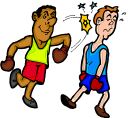Handling Anger Can Be Very Difficult!
 Have you ever been so angry at a sibling or friend that you hit them? Anger can be a scary emotion. It can flare up quickly and make you say and do things you might regret when you’ve calmed down. It’s one thing to hit another person — which is bad enough, but in today’s society, teens are often as likely to express their anger with some kind of weapon, even handguns.
Have you ever been so angry at a sibling or friend that you hit them? Anger can be a scary emotion. It can flare up quickly and make you say and do things you might regret when you’ve calmed down. It’s one thing to hit another person — which is bad enough, but in today’s society, teens are often as likely to express their anger with some kind of weapon, even handguns.
While it’s perfectly normal and healthy to experience or feel conflict with other people, it’s not normal or healthy to deal with that conflict violently. Conflict is disagreement or tension, violence is anger expressed with force or bodily harm.
The Centers for Disease Control and Prevention reports that homicide is the second leading cause of death for persons 15-24 years of age and is the leading cause of death for African-American and Hispanic youth in this age group in the USA. The CDC also reports that in 1998, 1 in 12 students in a national survey reported carrying a firearm for fighting or self-defense at least once in the previous 30 days. So the possibility is very real that if you make a classmate angry, you could become a victim of serious violence.
 An article that appeared in an issue of the Journal of the American Academy of Pediatrics reports that “today’s youth should be taught as early as possible how to handle disagreements with each other without letting their anger get out of control, and without using violence.” As they get older, they should apply conflict-solving to problems that they face.
An article that appeared in an issue of the Journal of the American Academy of Pediatrics reports that “today’s youth should be taught as early as possible how to handle disagreements with each other without letting their anger get out of control, and without using violence.” As they get older, they should apply conflict-solving to problems that they face.
Here are some reasons why learning to settle disputes fairly and nonviolently is important:
- Guns and other weapons are easily available in the U.S., and young people often don’t have a good sense of the consequences of their actions. So, they may think that an easy way to win an argument is to threaten opponents, which can lead to accidental injury or death, or even to the intentional use of a weapon.
- Teens who use violence may die young or spend their lives in prison.
- Teens who learn to solve problems fairly and nonviolently are respected by others, make friends more easily, and become role models for others.
- Teens who don’t know any ways to deal with disagreements may become the victims of bullies.
- Unless young people learn to reject and avoid violence, they may encourage the violence of others just by being willing to watch it without trying to help the participants find another way to settle their dispute.
- In communities where young people witness a great deal of violence, they may grow up thinking that using violence is the best or only way to end a disagreement, unless they are shown other equally effective methods.
Avoiding Violence
 What are some practical ways that you can avoid violent confrontations and diffuse anger? The journal article makes these recommendations:
What are some practical ways that you can avoid violent confrontations and diffuse anger? The journal article makes these recommendations:
- Figure out what methods to control personal anger work for you (like walking away from a tense situation or finding a calm person to talk to), and use them before losing control.
- Think ahead of time about the consequences of different actions: anger and violence versus walking away from a dispute or compromise.
- Use humor to cool hostility. (This doesn’t always work).
- Never fight with anyone using drugs or alcohol, or likely to have a weapon.
- Get as much information about a disagreement as possible, to help solve it and to head off feelings of uncontrollable anger.
- Try to think of solutions to a dispute that will give both sides something, and try to understand an opponent’s point of view.
- Show respect for an opponent’s rights and position.
- Don’t make bias (prejudice) against an opponent’s race, religion, sex, or sexual orientation a reason for a dispute.
- Show character by rejecting the bait for a fight, or accepting a compromise to a dispute, rather than responding with violence.
Learning martial arts is a wonderful thing, but be careful if you find yourself in a ‘violent situation’. You can’t stop a bullet with your body.
![]() Check out the Anger page — there’s a lot of good info there and videos…. Or see what to do if a bully is bullying you! Need more information?
Check out the Anger page — there’s a lot of good info there and videos…. Or see what to do if a bully is bullying you! Need more information?
![]() Violence and Teens – What Should Parents Know… and Dating Violence. See the Mental Health Section for more.
Violence and Teens – What Should Parents Know… and Dating Violence. See the Mental Health Section for more.
